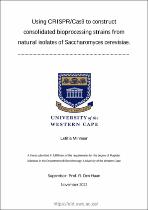| dc.description.abstract | Saccharomyces cerevisiae has gained much attention as a host for cellulosic bioethanol production using consolidated bioprocessing (CBP) methodologies, due to its high ethanol producing titres, heterologous protein producing capabilities, and tolerance to various industry-relevant stresses. Since the secretion profiles of heterologous proteins are relatively low in industrial and laboratory strains of S. cerevisiae, natural isolates may offer a more diverse genetic background with increased robustness to allow for improved heterologous protein secretion. In this study, the potential of natural and industrial S. cerevisiae strains to secrete a core cellulase enzyme complex (CBHI, CBHII, EG and BGL), encoded by genes integrated using CRISPR/Cas9 tools, was evaluated. | en_US |

